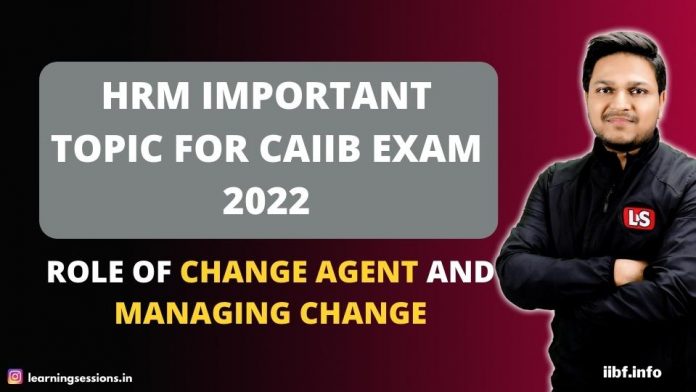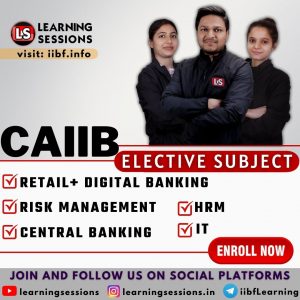
HRM IMPORTANT TOPIC FOR CAIIB EXAM 2024
HRM important topics to clear HRM exams easily. in this article Change Agent from the HRM Study Material prescribed by IIBF for CAIIB HRM EXAM 2024, important for HRM MCQs
This article is for the CAIIB candidates who have chosen Human Resource Management as their elective paper for CAIIB HRM Exams 2024. We have covered the meaning of Change agent & how this person is important as per the given HRM Syllabus 2024.
So, go ahead & take a read and you can also take up our Full Study Material on HRM as well as other papers such as ABM & BFM from the prescribed papers applicable for CAIIB 2024 Exams.
The Full Course material available for CAIIB 2024 Papers will have the following content & features:
Conceptual videos that will provide solid understanding on the syllabus as IIBF has prescribed for the Examination.
Question Videos also will be there where MCQs are taken up to clear the concepts
MCQs that can be attempted through our Android as well as iOS Apps
The videos will also include Case studies on the topics or concepts
Epdf notes will be provided as complementary material with the full video course
Videos & MCQs & all other content can be accessed 24 x 7
📚 JAIIB Study Resources 📚
👉 Check Here
👉 Check Here
👉 Check Here
👉 Get Tests Here
👉 Check Here
The HRM & other Study Material can be accessed from our website: www.iibf.info
Now, lets begin with our short conceptual notes on Change Agent:
ALSO READ-> CAIIB LATEST SYLLABUS NOV 2024
Q. Who is actually a Change Agent?
A change agent, who is otherwise called a supporter of change, is an individual who goes about as an impetus for the change management process. They help an association, or a part of it, by transforming how it operates via inspiration and influence. A change agent will always promote, champion, empower, and support an association’s change execution.
Q. What are the Responsibilities of Change Agents?
A. Key activities that a change agent performs include:
Conveying how change is gainful for both the association and workers
Paying attention to the all members of team and workers to acquire criticism and consolidate it in the implementation process
Understanding workers’ responses to change and diminishing resistance to change
Effectively engaging with workers by leading the change exercises.
Empowering and supporting workers to become advocators of change and advance it
Identification and directing other change agents and change experts to promote the same
Giving input on difficulties faced by the change management lead
Q. Who are Internal Change Agents & External Change Agents?
A. An associations is free to delegate change agents both from the inside or outside the association.
INTERNAL CHANGE AGENT: An internal change agent is typically a member of team like a director, senior chief, leader, HR professional, or another team member who understands behavioral sciences, organization development, and human intervention.
EXTERNAL CHANGE AGENT: An external change agent is an external advisor or outsider change professional with relevant expertise to drive changes. Organization rules, guidelines, and arrangements don’t matter to them, therefore, permitting them to deeply analyze different situations and propose reasonable change so as to suggest suitable change management models and strategies or techniques that assist with preventing change failures.
Even though outside change agents give a new point of view, their presence can compromise the current team members and their services can add to cost for lengthy change executions.
Q. What can be the Types of Change Agents?
A. Each change drive has unique requirements for which some change agents are expected to provide support. The following are three types of change agents to help bring organizational change:
1. People-Focused Change Agents: Individuals centered change agents assist individual workers with adapting to change by lifting employee morale and motivation. They investigate the matters of non-attendance, turnover, and the nature of work performed by means of behavior modification, goal setting, & job enrichment.
2. Organizational & Operational Structure Change Agents: These change agents center around changing the organizational structure to further develop effectiveness and efficiency. Organizational structure change agents utilize different logical methodologies, for example, operations research, systems analysis, and policy to change the association’s design or technology.
3. Internal Process Change Agents: The main focal point of these change agents is internal cycles, for example, intergroup relations, correspondence, and decision making. Internal process change agents settle on social changes to bring permanent changes by conducting sensitivity training, team building and worker reviews.
Q. What is the Role of Change Agents in an Organization?
A. A change agent expects at least one role in view of the necessities and prerequisite of a change project. The four unmistakable roles of change agents are:
1. Consultant: This change agent job acts as a change to ensure a bidirectional flow of data, and afterward directs further examination of the data to give noteworthy insights to the team members.
2. Communicator & Advocator: While carrying out change, associations frequently center a lot around operations and not on change communication.
The change should be understood and supported by the members for it to be a success.
3. Trainer: As well as being a agent, a change manager frequently assumes the job of a coach to assist with team members follow up on the insights gained from data analysis acquired from information investigation and assist them with acquiring new abilities to set them up for the new computerized or specialized change.
4. Researcher: As a agent, a change agent centers around taking care of current issues and anticipating future concerns. He likewise directs competitive analysis and assesses the viability of an association’s implementation plan and overall change management strategy.
A few different agents of change examples include:
An expert or internal researcher entrusted with distinguishing what changes are required in an association
A head of a cross-functional stretch team entrusted with finding an innovative solution for a complicated issue that keeps an organization far from trouble
A learning and improvement professional entrusted with preparing and supporting team members during a change
A supervisor or chief entrusted with carrying out another product framework or digital transformation process
So, this is it for Change agents right now. You can find our other notes on important concepts of HRM paper of CAIIB Exam 2024 on our website: www.learningsessions.in





